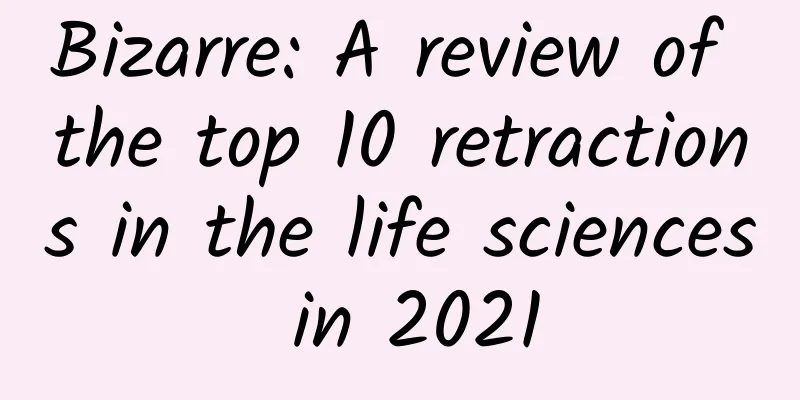Bizarre: A review of the top 10 retractions in the life sciences in 2021

|
Since the outbreak of the COVID-19 pandemic, journals have retracted more than 200 COVID-19-related papers, most of which occurred in 2021. In contrast, the Retraction Watch database has collected more than 3,000 retracted articles this year. Following its annual practice, TheScientist (www.the-scientist.com) has compiled the top ten most notable retractions in the life sciences in 2021. Compiled by Veronica From Star Trek to ivermectin, the topics of papers retracted in the past year ranged widely. Most of the retracted papers were lost in the dust of history, but some of them became interesting anecdotes among researchers. 1 Victor Grech, a pediatric cardiologist in Malta, is as obsessed with Star Trek as many people are. The problem is that he single-handedly turned Elsevier's Early Human Development magazine into a Star Trek science fan magazine. At the end of 2020, Hampton Gaddy, an undergraduate student at Oxford University in the UK, wrote to the editor of the journal Early Human Development, saying that Grech had published at least 113 articles in the journal, 19 of which were "unprofessional articles". These "medical papers" were far from the main purpose of the magazine, and included an analysis of the role of nurses in Star Trek, a discussion of the banality of evil in Star Trek, and an analysis of the role of doctors in Star Trek... In the end, Grech "lost" 26 articles. Figure 1. Report from the Retraction Watch website. Early Human Development is a comprehensive interdisciplinary journal that publishes original research and clinical papers on early human growth and development, with a particular focus on the continuity of the fetal and perinatal periods, the impact of early events on postnatal growth, and how to ensure the quality of human life. The articles published in this journal cover a variety of disciplines, including human embryology, perinatal medicine, obstetrics and gynecology, pediatrics, epidemiology, behavioral science, brain science, and developmental psychology. | Source: retractionwatch.com 2 As early as 2015, the University of Colorado Denver issued a notice that their former faculty member Hari Koul needed to correct or withdraw nine papers containing problematic images. However, six years have passed, and most of the articles are still safe and sound, and many of the journals involved even claimed that they had never heard of Koul's investigation. Figure 2. On June 3, 2021, the Retraction Watch website reported that Curry had not retracted the paper. | Source: retractionwatch.com In June of this year, Retraction Watch reported the situation, and the Journal of Urology quickly removed three of Kuhl's articles. At this time, Kuhl had already left Denver and went to Louisiana State University's Health Science Center (LSU HSC), and eventually took a position at the school's New Orleans campus. After the local media broke the news, LSU HSC announced that they were investigating the matter, and Kuhl was forced to resign as department head. 3 In June this year, a paper published in the journal Vaccine claimed that "For three deaths prevented by vaccination we have to accept two inflicted by vaccination." This caused public outrage in the scientific community. Two editors of Vaccine even resigned in protest. The author of the paper, Harald Walach, is described on his Wikipedia page as a "parapsychologist" and "supporter of alternative medicine" (see Figure 3 for details). Figure 3. Wikipedia shows that Valek is a "parapsychologist" who supports "alternative medicine." Parapsychology studies supernatural phenomena such as extrasensory perception, telepathy, clairvoyance, and precognition. It is considered pseudoscience because it cannot provide convincing evidence. Alternative medicine refers to all medical practices that claim to have medical effects but fail to collect evidence using scientific methods, such as homeopathy, naturopathy, faith therapy, etc., and their effects are often proven to be ineffective or cannot be proven at all. 丨Source: Wikipedia.org Vaccine magazine responded quickly and immediately retracted the article. At the same time, the institution where Valek worked in Poland, the University of Poznan Medical School, responded to this and fired him. But Valek himself still insisted that although his paper data was not perfect, the analysis process was correct. Shortly thereafter, another article by Valek published in JAMA Pediatrics was also retracted two weeks after publication. The article stated that children wearing masks would cause excessively high concentrations of carbon dioxide to be inhaled, but the research methods and conclusions were untenable. 4 Jonathan Pruitt of McMaster University in Canada is a well-known behavioral ecologist whose field research on spiders is the basis of many papers. However, in 2020, the validity of his paper data began to be widely questioned. First, the ecology journal The American Naturalist retracted a paper published by Pruitt in 2016 in January last year (suspected of data duplication), and then the Proceedings of the Royal Society B also retracted one of his papers. Since then, scientists have mobilized to review nearly 150 journal papers published by Pruitt. Within a year, 12 of Pruitt's papers were "taken off the shelves." On November 12, 2021, the University of Tennessee revoked Pruitt's doctoral dissertation. On November 16, McMaster University ended its investigation into Pruitt and forced him to take paid leave. On December 1, the famous "Canada 150 Research Chairs" project removed Pruitt from the list. Figure 4. The laboratory website of Pruitt, a famous spider behavior expert. The website shows that Pruitt is on administrative leave and is not at school. | Source: pnb.mcmaster.ca/pruittlab 5 When Indian gastroenterologist Cyriac Abby Philips published a paper in the Journal of Clinical and Experimental Hepatology in 2018 reporting on a 24-year-old woman who died of acute liver failure after taking an herbal supplement made by the health company Herbalife, he never imagined that three years later he would be considering suing the journal for defamation. After the case study was published, several researchers with vested interests in Herbalife asked the journal to retract the paper, citing "lack of evidence." At the request of the editor-in-chief, Phillips responded to the questions raised by these experts one by one. Finally, under the pressure of multiple legal letters from Herbalife, the editor-in-chief proposed to review the paper in accordance with the guidelines of the International Committee on Publication Ethics (COPE) to ensure its academic integrity. The review results showed that the paper had neither data falsification nor plagiarism, and was a "clean" paper. In January 2021, Elsevier informed Phillips that the journal would withdraw the paper for "legal reasons." However, since then, the reason for the withdrawal statement has become "the article's scientific research methods, data analysis and interpretation are insufficient," and the statement also declared the article "unreliable." Figure 5. The retraction statement states that neither the Journal of Clinical and Experimental Hepatology (JCEH) nor the Indian National Association for the Study of the Liver (INASL) supports the content and conclusions of the article [1]. In June 2021, Phillips claimed that the retraction statement constituted serious defamation ("highly defamatory"), "contrary to professional ethics and natural justice", and warned that he would sue the publisher and the journal for up to $1.35 million in compensation. Elsevier immediately revised the statement again, changing it back to "removing the paper for legal reasons", and the article can no longer be seen on PubMed. However, the matter is not over yet - Phillips has filed an arbitration with the International Committee on Publication Ethics, accusing the president of the Indian National Association for the Study of the Liver (INASL) of manipulating the editor-in-chief of the journal to withdraw the paper without the full consent of the editorial board, which violated the guidelines of the committee. Phillips asked the Publication Ethics Committee to come forward and restore the 2018 paper, otherwise they may take legal action. 6 Generally speaking, the retraction of a paper usually occurs several years later, but there is a "short-lived" paper that was retracted just one month after its publication. In mid-November 2021, a research team from New York University Abu Dhabi published a paper in the journal Nature Communications, saying that "female scientists perform better under the guidance of male mentors." The article was strongly condemned as soon as it was published online, and Nature Communications had to choose to retract the manuscript amid overwhelming criticism. One statistician commented on Twitter: “This paper doesn’t tell us much about how gender affects the quality of mentoring, but it certainly tells us that the statistical community needs to do more to teach scientists about correlation, causation, and confounding.” The authors of the article acknowledged the journal's decision to retract the article and said they "deeply regret" that "the article has caused pain at the individual level and has triggered strong reactions among the scientific research community." 7 Pierre Kory, chief associate professor at the University of Wisconsin School of Medicine and Public Health, has recently been at the center of the controversy over ivermectin. In May 2020, Corey testified to the U.S. Senate that MATH+ therapy can reduce the risk of death from COVID-19 by 75% compared with other treatments. MATH+ is an intensive care program that uses methylprednisolone, vitamin C, vitamin B1 and heparin to intervene in the treatment of patients. In December 2020, Corey published his research results on MATH+ in the Journal of Intensive Care Medicine, but added a controversial drug, ivermectin, to the protocol, causing other experts in the field to question whether the effectiveness of MATH+ therapy was exaggerated. Amid the doubts, in November this year, the journal withdrew Corey's paper, citing "inaccurate data." In addition, in March this year, one of Corey's papers on ivermectin was retracted from Frontiers in Pharmacology. 8 At the end of 2020, the journal Eurosurveillance announced that in response to an international "petition", they would carefully investigate a paper published in January of that year on the effectiveness of real-time RT-PCR (real-time reverse transcription polymerase chain reaction) technology in detecting the new coronavirus SARS-CoV-2 (then called 2019-nCoV). The paper was received on January 21 and accepted on January 22, which was a rare speed. By early December 2020, it had been cited more than 800 times. The corresponding author of the article, Christian Drosten, is a renowned virologist at Berlin's Charité University Hospital. Like Anthony Fauci in the United States and Dr. Zhang Wenhong in China, Drosten played an important role in the fight against the virus in the early days of the COVID-19 pandemic in Germany, but he has become a target of concentrated attacks by conservatives. Conservatives believe that RT-PCR tests are not sufficient to detect the virus, so positive results are meaningless and should not be used to guide public policy - especially measures such as lockdown that hinder economic development. On November 27, 2020, 22 independent researchers from Europe, America and Asia submitted their review of Durston’s article to the journal Euromonitor, stating that the paper had “flaws in its scientific methods” (listing ten of them), and requested the journal to publish their review results and withdraw Durston’s paper. The review was subsequently published on a website called Global Research (globalresearch.ca). [2] The announcement by the journal Euromonitor emboldened opponents of virus testing. However, two months later, on February 4, 2021, the editor of the journal issued a statement in response, saying that the paper would be retained, or more precisely, that it "did not meet the criteria for retraction." Figure 7. Bobby Rajesh Malhotra, the second author of the petition, sent 124 tweets to expose Durston's "evil conspiracy". 丨Source: twitter.com 9 Ivermectin is a drug that is effective against a variety of parasites. It was purified from avermectin by organic chemist Satoshi Omura and biochemist William Campbell. The two inventors shared half of the 2015 Nobel Prize in Physiology or Medicine. In April 2020, a research team from Monash University in Australia published an article in the journal Antiviral Research[3], stating that ivermectin can inhibit the growth of the new coronavirus on cells within 48 hours. This conclusion was later quoted out of context by online rumors as "ivermectin can kill the new coronavirus." Since then, the saying that "ivermectin can effectively treat COVID-19" has been widely circulated. Although there is no evidence, ivermectin supporters are convinced of this. In May 2021, a study that excited ivermectin fans came out of nowhere and was published in the journal Viruses. This randomized controlled trial claimed that a single dose (calculated based on weight) of ivermectin was enough to "reduce patient symptoms, reduce viral load, and reduce patient hospitalization rates." Everything looks perfect - except that the data is not real. On October 6, BBC News reported that the study "copied and pasted detailed information of 11 patients, indicating that many of the so-called 'patients' in the trial did not really exist" [4]. On October 26, the journal Viruses retracted the paper. [5] In response, the paper's author, Ali Samaha of the School of Public Health at the Lebanese University, admitted that they had mixed up some of the data files, but insisted that "a re-analysis of the correct data showed that the original conclusions were still valid." Ironically, this study was previously included in a meta-analysis on the advantages of ivermectin in treating COVID-19[6]. The results of this analysis are still “strong” to this day, so you can imagine how reliable it is. 10 Finally, we welcome what we consider to be the “most exciting event of the year”. After readers pointed out that some papers were complete nonsense, as of November 4, 2021, the Arabian Journal of Geosciences, the official journal of the Saudi Geological Society, was forced to retract 44 articles for "special reasons." How did the clever readers find out what was wrong? It is said that the titles of such papers read like a crazy word-filling game played by a group of drunken graduate students: "Neural network-based urban rainfall trend estimation and adolescent anxiety management" (Jiujiang College), "Distribution of earthquake activity in mountain area based on embedded system and physical fitness detection of basketball" (Jinan University)... Most of these papers are logically confusing, far-fetched, and pieced together with terminology from different fields. How did the articles get accepted is puzzling. Unfortunately, most of these 44 articles involve Chinese researchers, some even from 985 universities. A guest editor of the magazine once claimed that these inexplicable articles appeared because the email was hacked (this reason seems to be familiar to everyone). In fact, these 44 articles only reveal the tip of the iceberg of Springer Nature. 220 papers published by the company and about 400 articles published by Elsevier all have similar problems. Figure 8. 44 articles collectively retracted. 丨Source: Breaking the record! Springer Nature's journals have paid attention to more than 400 articles written by Chinese scholars at one time, and 44 of them have been retracted (attached with a list of names) References [1] https://www.jcehepatology.com/article/S0973-6883(18)30654-6/pdf [2] globalresearch.ca/external-peer-review-rt-pcr-test-detect-sars-cov-2-reveals-10-major-scientific-flaws-molecular-methodological-level-consequences-false-positive-results/5730889 [3] https://www.sciencedirect.com/science/article/pii/S0166354220302011 [4] https://www.bbc.com/news/health-58170809 [5] https://www.mdpi.com/1999-4915/13/11/2154 [6] https://journals.lww.com/americantherapeutics/fulltext/2021/08000/ivermectin_for_prevention_and_treatment_of.7.aspx This article is authorized to be translated from TheScientist e-magazine (www.the-scientist.com), the original title is "The Top Retractions of 2021". Click "Read original text" at the end of the article to view it. The pictures and extended content of the article are added by the translator. Copyright statement: Personal forwarding is welcome. Any form of media or organization is not allowed to reprint or excerpt without authorization. For reprint authorization, please contact the backstage of the "Fanpu" WeChat public account. |
<<: The past and present of the "Xiangyanghong 09" ship
>>: After radiotherapy, heart examination should be performed every year! International consensus
Recommend
Analysis of brand event marketing!
In recent years, the life cycle of traffic stars,...
Hiss! Burned by the hot pack again? We did an experiment to reveal the truth about the burns caused by the hot pack!
Every winter, we always see a lot of news about p...
How to optimize Weibo advertising creativity? Analysis of 2 advertising cases
This article shares two Weibo advertising optimiz...
China Passenger Car Association: Wholesale sales of new energy vehicles will reach 1.369 million units in October 2024, a year-on-year increase of 55.2%
According to the data from the China Passenger Ca...
The mini-programs are 2 years old and the mini-games are 1 year old, what should we expect on WeChat’s 8th anniversary?
There are still 14 days left until 2019, and WeCh...
[Crypto] Gu Yu is proficient in volume price analysis 50 episodes of video
[Encryption] Gu Yu is proficient in volume price ...
A 20,000-word article reveals in depth the growth hacking strategy of Amazon’s 100 billion revenue
Amazon , an e-commerce company known as "the...
17 "hype methods" to promote your product
What I’m going to teach you today is not some cro...
International Energy Agency: Energy Efficiency Report 2023
The International Energy Agency has released its ...
Be determined not to be a “lone swimmer”, please remember this knowledge!
The weather is hot in summer How to avoid drownin...
The heavy rain in Shanxi was caused by the blocking of the northwest wind?
This article was first published by Hunzhi (WeCha...
The 4 user quadrants of product promotion!
When we promote our products , the first thing we...
Standard SOP process for event planning
A complete event planning plan includes event the...
How did these awesome Internet companies like Didi Dache, Momo, and Meituan promote themselves in the early stages?
How did Didi, Momo, and Meituan promote themselve...









